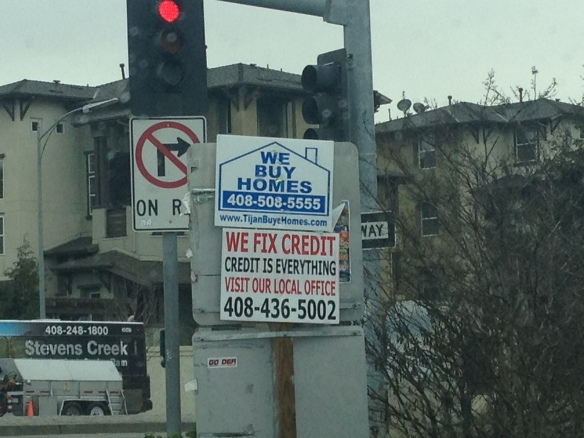Editor’s note: This is post #1 in a two-part series. You can read part 2 here.
By Sean Coffey, Program Manager, Foreclosure Help
The California Housing Consortium recently sponsored the 1st Annual Homeownership Forum. The theme for the day was “Stabilizing Homeownership and Communities in the Post-Foreclosure World” and panelists and participants discussed current efforts to repair the housing market, while creating and retaining affordable housing. To see the agenda and speaker slides, visit the CHC website.
Two themes emerged during the day:
1) While many potential homebuyers are ready (including first time homebuyers), engaged and excited to buy a home in the Bay Area, many of them are unsuccessful when they make offers right now because they are competing with all-cash offers from investors.
2) There is not one “single bullet” policy or program that will fix the housing market, but it will likely be a combination of programs, policies, and financing mechanisms, both from the public and private sector that will help the housing market to recover.
Repairing credit after an improper foreclosure?
One of the most interesting comments of the day came during a conversation with a fellow audience member when she asked me if there are any plans to assist homeowners with fixes to their credit reports if they were the victim of an improper foreclosure. I am not aware of this being included in the Independent Foreclosure Review, but it seems logical that if a homeowner’s credit was damaged because of an improper foreclosure, (and the bank admitted it was an improper foreclosure by paying compensation under the Independent Foreclosure Review), then the bank/servicer could also notify the three credit reporting agencies that the foreclosure proceedings were improper.
Upon receiving this information, the credit agencies could code the person’s credit report appropriately, and there should be a subsequent “bounce” in the person’s credit score, and a lower cost of credit for that homeowner. Given the increased scrutiny that Experian, Equifax, and Transunion now face by the Consumer Financial Protection Bureau, this is an idea worthy of consideration, and could potentially restore some faith in the credit bureaus, who have faced criticism recently over errors in a substantial number of consumer’s credit reports. (See our previous post on this topic: “New Report: 1 in 10 Consumers Have Incorrect Credit Score“)
FHA’s Role in “Healing” the Market
Carol Galante, recently confirmed as the Assistant Secretary for Housing/Federal Housing Commission, opened the day and cited the importance of FHA loans in helping to repair the market, with nearly four million FHA loans completed since the beginning of the crisis, with 80% of these loans made to first time homebuyers.
Galante is the FHA Commissioner, and she discussed efforts FHA is making or considering making to repair the market, including selling pools of loans where all of the loans are at least six months delinquent. In this model, investors could purchase a pool of delinquent loans, and then work with homeowners to modify the mortgage to an affordable level.
She also cited FHA’s 203K loan, which allows homeowners to pay for repairs to a home using the mortgage that they are using to buy the home to also finance the repairs. However, she noted that the current limit of seven homes could prevent non-profits from using the program, and suggested that lifting this limit could allow non-profits to use this loan more broadly.
Galante also touched on a few other hot topics, including whether pre-purchase counseling should be mandatory, and how to pay for it, and do it in such a way that it’s meaningful for potential homeowners. Audience questions touched on a recent settlement where a bank disclosed that it had inappropriately given homeowners FHA loans (when they didn’t need them), as well as the difficulty that first-time homebuyers are having in competing against all-cash investors.
This is post #1 in a two-part series. You can read part 2 here.
Related articles:
-
March Madness: 9 Important Updates on the Independent Foreclosure Review; Short Sales, Modifications, and Foreclosures (foreclosurehelpscc.wordpress.com)
-
Rebuilding credit after a Foreclosure or Short Sale (foreclosurehelpscc.wordpress.com)
-
Help with rental assistance after a foreclosure – What’s out there? (foreclosurehelpscc.wordpress.com)
If you are a homeowner living in San Jose or Sunnyvale and are struggling with your mortgage, please contact ForeclosureHelpSCC, a program funded by the City of San Jose and the City of Sunnyvale at (408)-293-6000 or visit us: www.foreclosurehelpscc.org
Our housing counselors can help you evaluate your options, learn more about federal and state programs that may help you with your mortgage issues, and will help you create a plan forward.Please note: All content included in the ForeclosureHelpSCC blog is provided for information only and should NOT be considered legal or tax advice. If you have any questions, please feel free to contact us on our hotline: (408)-293-6000, or visit our website: www.foreclosurehelpscc.org or send us an email: help@foreclosurehelpscc.org.
Si usted es dueño de una casa en San José o en Sunnyvale y están luchando con su hipoteca, por favor póngase en contacto con ForeclosureHelpSCC, un programa financiado por la ciudad de San José y la ciudad de Sunnyvale, al (408) -293- 6000, o visite nuestro sitio: www.foreclosurehelpscc.org.Nuestros consejeros puede ayudarle a evaluar sus opciones, aprender más acerca de los programas federales y estatales que pueden ayudarle con sus problemas de hipoteca, y le ayudará a crear un plan para seguir.
Por favor, tenga en cuenta: Todos los contenidos incluidos en el blog ForeclosureHelpSCC se proporciona únicamente a título informativo y no debe ser considerada como consejo legal o fiscal. Si usted tiene alguna pregunta, por favor no dude en contactarnos a nuestra línea directa: (408) -293-6000, o visite nuestro sitio:www.foreclosurehelpscc.org o envíenos un correo electrónico: help@foreclosurehelpscc.org.
Nếu bạn là một sinh hoạt chủ sở hữu nhà ở San Jose hoặc Sunnyvale và đang đấu tranh với nợ nhà, xin vui lòng liên ForeclosureHelpSCC, một chương trình được tài trợ bởi thành phố San Jose và thành phố của Sunnyvale ở (408) -293-6000 hoặc truy cập trang web của chúng tôi: www.foreclosurehelpscc.org.
Nhân viên tư vấn của chúng tôi đã được HUD chấp thuận có thể giúp bạn đánh giá các lựa chọn của bạn, tìm hiểu thêm về các chương trình của liên bang và tiểu bang có thể giúp bạn với các vấn đề thế chấp của bạn, và sẽ giúp bạn tạo ra một kế hoạch phía trước.Xin lưu ý: Tất cả các nội dung trên Blog ForeclosureHelpSCC được cung cấp thông tin duy nhất và không nên coi là hợp pháp hoặc tư vấn thuế. Nếu bạn có bất cứ câu hỏi , xin vui lòng liên hệ với chúng tôi qua đường dây nóng: (408) -293-6000, hoặc truy cập vào trang của chúng tôi: http://www.foreclosurehelpscc.org hoặc gửi email cho chúng tôi:help@foreclosurehelpscc.org.



